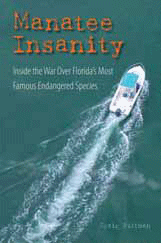SEJournal Online is the digital news magazine of the Society of Environmental Journalists. Learn more about SEJournal Online, including submission, subscription and advertising information.

BookShelf
Manatee Insanity: Inside the War over Florida's Most Famous Endangered Species
By Craig Pittman
University Press of Florida, $27.50
Reviewed by JoANN M. VALENTI
Despite its iconic status in Florida, the gentle, slow-moving manatee may soon be found only in popular lore and on a few vehicle license plates. St. Petersburg Times environmental journalist Craig Pittman issues this warning in his new book on the Florida manatee, the second he has published on major threats to the Florida environment. His previous title, Paving Paradise: Florida's vanishing wetlands and the failure of no net loss, came out last year and has received several book awards, including one from SEJ.
Pittman, a long-time, award-winning SEJ member, takes on powerboat owners, policy makers and environmentalists to tell the sea cow's story. A skilled investigator ripe with stories, he captures the history, politics, science and backwoods Florida "cracker" culture that explain its imperiled status.
Though listed as an endangered species in 1967 (prior to the passage of the Endangered Species Act in 1972), the manatee remains as imperiled today as it was decades ago. Thousands of animals have perished after encounters with speed boats. Some estimates have two-thirds of the remaining manatee population scarred by propellers or hulls, many of the animals injured repeatedly. A quote from Jacques Cousteau aptly sums up the mess: protection of nature "all rests on man's ability to control himself." Manatees frequent the remaining springs around the state, particularly during colder weather. (For a look at some of Florida's critical springs, see Aquiferious by Margaret Ross Tolbert (2010) or go to aquiferious.com)
In 18 chapters (some with catchy titles like "Barnacle Brain & Parrotheads" or "The Dude Abides") and 400 pages, Pittman evokes the feel of Florida and its characters and shares details not offered in newspaper accounts. If manatees could talk he'd likely find a way to interview them, too. He did swim with them — although wildlife specialists would like to see an end to that practice — and he watched biologists dissect them.
Here's a sample of the insanity Pittman couldn't fit in to his regular reports for the Times: A blond realtor in black leather pants and stiletto heels complains to TV news cameras covering one of the heated hearings to reduce manatee-boat collisions, "This creature is infringing on my habitat." (She cares less than a hoot, apparently, about the value of manatees as a tourist attraction. Her clients want houses on the water, with docks for their testosterone-fueled motorboats. Lots of 'em.) A columnist at a small town paper writes that "manatees looked to him like cigars in a toilet bowl that won't flush." This columnist, Pittman writes, argues "people are warm and fuzzy too" as he sided with those in favor of opening waterways that were put off limits to boaters to provide some small measure of safety for the animals.
Wildlife commissioners, Pittman reports, consistently choose human recreation over protecting flora or fauna. The environmental community, he also notes, has been too busy claiming turf and making compromises to be any help to scientists struggling to preserve the remaining manatee population. Restrict development? Not a chance. Get a handle on condos and cabin cruisers? Are you kidding? Places for the animals to hide — simple refuge — is at the heart of the manatee battle. There's no sanctuary for the state's wildlife, only fun in the sun and a final resting place for tropical respite seekers.
JoAnn Valenti, like Pittman a suffering Florida native, is a member of SEJournal's editorial board.
* From the quarterly newsletter SEJournal, Fall 2010 issue.












 Advertisement
Advertisement 



